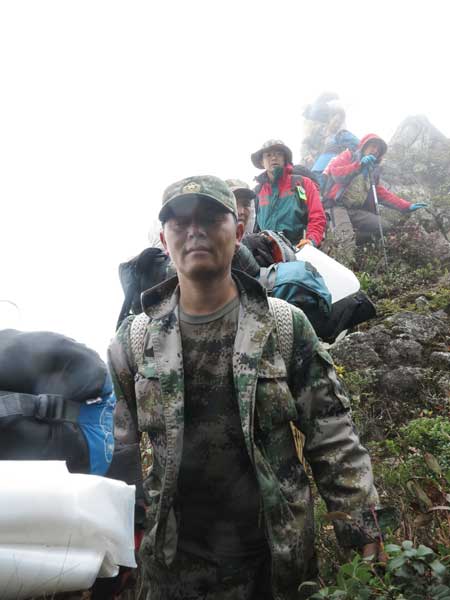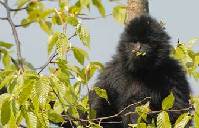Searching for a song
 |
|
Participants of the trekking event descend a ridge of the Ailao Mountains in Yunnan province. |
Name from nature
At 9:30 am, our coach arrived in Yaojie township with an elevation of 900 meters and turned onto a narrow road winding up the mountains. Spread over nearly 1,000 km in Yunnan with nine peaks reaching 3,000 meters above sea level, Ailaoshan is between the Hengduan Mountains and Yunnan-Guizhou plateau and one of the region's major geographic boundaries.
Soon the paved road became a dirt lane which grew narrower the higher we climbed. We passed villages and terraced rice and sugarcane fields.
| Last of the gibbons |
At 10:30 am, the bus driver decided it was too dangerous to keep going. About 20 of us were left on the road halfway up the mountain and had to wait for the reserve's three four-wheel drives to shuttle us to the village.
In the village we met 12 patrolmen of the Xinping bureau, who would be our guides, cooks and porters over the next four days, and had our final meal seated at tables. About 1,800 meters above sea level, the hamlet overlooked the rolling clouds.
After lunch, we scaled a slope behind the village, carrying our own overloaded backpacks. We were tackling the first slope when an ecotourism planner from the United States, who is based in Hainan province, decided it was too much for her and turned back.
Up and up, one slope after another. Xinping bureau's director Yang Xianming said the trails were newly maintained by the patrolmen before the trip, but they were still narrow, steep and slippery.
Soon several patrolmen passed me by and I started lagging behind. I could feel my upbeat mood starting to wane. The only encouraging thing was the changing scenery.
After a two-hour climb, I finally reached the ridge line. The trail became gentler and the views were open and spectacular.
We passed the reserve's border and entered "the world of western black-crested gibbons" - its scientific name is "middle-mountain moist evergreen broadleaf forest".
The trees are big, with lichens and ferns covering their trunks and branches. Beneath the trees are dense groves of bamboo. With the exception of several heaps of cattle dung, we hardly saw any trace of interference.
I arrived at our campsite at 5:30 pm and was exhausted. Enfolded by valleys and with a stream running through it, the campsite was an open field surrounded by trees, big enough for us to play a team game after dinner.
The game required participants to give each other a nickname from nature.
It was designed to help us get to know each other. Suddenly we were making friends with names such as "gibbon", "bear", "squirrel" and "rose".
That night the galaxy overhead was clear and close.
Related:
Although few participants of the recent trek on the Ailao Mountains (Ailaoshan) managed to hear the western black-crested gibbons' duets, no one seemed to regret taking part. More...
For more Eco China, here

















